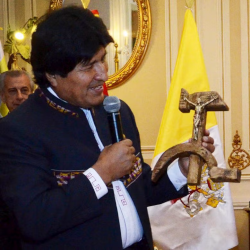The São Paulo Forum’s origin can be traced back to a call made by former presidents Lula and Fidel Castro to all leftist parties, movements and organizations in July 1990 to reflect upon the events in the aftermath of the fall of the Berlin Wall and upon alternative and autonomous paths from the standpoint of the Latin American and Caribbean left that would go beyond the traditional responses.
The first meeting was held in the city of São Paulo, in July 1990, and brought together 48 parties and organizations representing the multiple experiences from all across the Latin American and Caribbean political and ideological spectrum. From that meeting came the São Paulo Declaration (Declaration), a historical document that expresses the aspirations, principles, and goals of every party and movement present then. Highlights of the Declaration are the following goals:
“Push forward with consensus proposals for unity of action in the anti-imperialist and people’s struggle.
“We shall promote specialized exchanges focused on economic, political, social, and cultural issues
“[…] in opposition to the proposal for integration under imperialist domination, [ to define] the cornerstones for a new concept of continental unity and integration.
At the following meeting, held in Mexico City in 1991, the name “São Paulo Forum” was adopted, setting in motion a coordination of Latin American and Caribbean political parties and movements opposing neoliberalism and imperialism and committed to the regional integration, sovereignty, and self-determination of Latin America and the Caribbean and of our nations.
The following meetings reaffirmed the political will to continue on that path of dialogue and exchange among a number of political parties and movements of Latin America and the Caribbean. Year after year, political accomplishments showed the growing influence of the São Paulo Forum parties in the region. Throughout the 1990s those parties engaged in resistance against the orthodox policies of the neoliberal model and reached out to the social, trade union, and grassroots movements in the scope of the campaigns against the Free Trade Area of the Americas (FTAA) and for building the World Social Forum (WSF). Between the late 1990s and the mid-2000s, many of those parties reached for the first time the national governments of their countries with a series of landmark regional electoral victories.
At the Forum’s annual meetings, as well as at the subregional and sectoral meetings, were consolidated the anti-neoliberal platforms that would become the blueprint for the victorious tactical and electoral programs of leftist parties and progressive coalitions, allowing the São Paulo Forum to call for regional and international political backing for the Latin American and Caribbean progressive administrations.
In spite of each country’s social, economic, and political specificities, in broad lines and to various degrees, the new leftist, progressive, people-democratic governments managed to reduce the historical inequalities present in our continent by means of a range of public policies of an inclusive nature, and applied autonomous foreign policy and regional integration guidelines clearly expressed in, for instance, the political reorientation of the Common Market of the South (Mercosul), the creation of the Bolivarian Alternative for the Americas (ALBA), the Union of South American Nations (UNASUL), and the Latin American and Caribbean Community of States (CELAC).
In a context of a strong neoliberal counteroffensive in the continent that began in 2015, the Working Group of the São Paulo Forum submitted, in January 2017, to the Forum’s member parties a new document – the Our America Consensus (Consensus) – analyzing our trajectory that far and proposing new debates and courses.
The Consensus also submits to debate its strategic orientations, premised on the idea that the transformations needed to change and develop Latin America and the Caribbean go beyond a national project and require the development of a regional community with general and common goals and principles, adopted in solidarity and conscious of national specificities.
Structure
The São Paulo Forum, as a coordination of Latin American and Caribbean political parties and movements, today counts 123 member parties from 27 countries that gather for an annual meeting, and a Working Group with representatives from 16 countries that meets periodically.
The São Paulo Forum has three regional departments: the Southern Cone department, headquartered in Uruguay; the Andean Amazonian department, temporarily based in Colombia; and the Mesoamerican and Caribbean department, headquartered in El Salvador.
Lastly, the São Paulo Forum has an Executive Secretariat, which is responsible for carrying out the decisions made at the annual plenary meetings and regional meetings, and by the Working Group, and is presently headquartered in São Paulo.
The annual meetings bring together, in addition to member parties, guests from social movements and political organizations from other continents. Among the activities carried out, we highlight the general plenary sessions; the sectoral meetings: Women, Youth, African Descendants, Original Peoples, the Foundations and Schools Network, among others; thematic workshops: Media, Anticolonial Fight, Seminar on Progressive Governments, among others; and the Training School.
The São Paulo Forum is in close and constant dialogue with representatives from the continent’s social movements and organizations for the purpose of building common agendas and actions, including among others, the World Day against Imperialism, the Hemispheric Day for Democracy and against Neoliberalism. The São Paulo Forum also has exchange and cooperation relations with political and social forces from other continents, having actively participated in several World Social Forum meetings, among other world and regional events.
The São Paulo Forum has political relations with other initiatives by Latin American and Caribbean political parties, like the Permanent Conference of Political Parties of Latin America and the Caribbean (COPPPAL) and the Latin-American Socialist Coordination (CSL), as well as with organizations from other continents.
Announcements & Information
Megathreads and spaces to hang out:
- :meow-fiesta: Come listen to music with your fellow Hexbears in Cy.tube
- :meow-knife-trans: Come talk in the New weekly queer thread
- :meow-bounce: Monthly Neurodiverse Megathread
Reminders:
- :meow-floppy: You can join specific comms to see posts about all sorts of topics
- :meow-cactus: Hexbear’s algorithm prioritizes struggle sessions over upbears
- :meow-bernie: Remember to sort by new you nerd
- :meow-bug: If you ever want to make your own megathread, you can go here nerd
- :meow-popcorn: May Movie Schedule
Links To Resources (Aid and Theory):
Aid:
- :feminism: Comprehensive list of resources for those in need of an abortion -- reddit link
- :palestine-heart: Resources for Palestine
Theory:
- :meow-tankie: : Foundations of Leninism
- :meow-anarchist: Anarchism and Other Essays
- :meow-floppy: Mega upload with theory for many tendencies
we need more meow emotes :meow-bug:
We need more meow emotes :meow-bug: , also new mega start posting nerds :posting: , i won in backpack hero twice today :meow-fiesta:
@aaaaaaadjsf @Abraxiel @AnarchaPrincess @Antilope @Alaskaball @BrookeBaybee @bbnh69420 @budoguytenkaichi @buh @CARCOSA @CDommunist @Cherufe @ClathrateG @ClimateChangeAnxiety @clover @comi @Commander_Data @ComradeCmdrPiggy @ComradeEchidna @context @congressbaseballfan @crime @DasKarlBarx @DeathToBritain @Dirt_Owl @Eco @ella @el_principito @EmmaGoldman @FidelCashflow @Frogmanfromlake @GalaxyBrain @ghosts @Goadstool @GoroAkechi @Grownbravy @halfmoon @JamesConeZone @Kanna @Kaputnik @kristina @Koa_lala @LeninWeave @LoudMuffin @Lundi @marxisthayaca @marzimpan @MaybeNickCage @MelaniaTrump @Mindfury @Ness @PM_ME_YOUR_FOUCAULTS @PorkrollPosadist @PootrKrobuttkin @PurrLure @Ram_The_Manparts @Redcuban1959 @REallyN @RNAi @RoseColoredVoid @Sandinband @SorosFootSoldier @Spike @TankieTanuki @Tervell @ThisMachinePostsHog @Trouble @ultraviolet @UlyssesT @viva_la_juche @WIIHAPPYFEW @Wmill @wtypstanaccount04 @Yanqui_UXO @Zoift
its an indie game in kickstarter, the demo is free and really fun
The fact that Elizabeth Olsen talked about how good Red Scare is in an official interview for the Doctor Strange press tour is just destroying my brain. Normie lib Marvel shit was never meant to interact with terminally online borderline-NazBol white girls.
How the hell does reality intersect with itself like this? It's exactly like the Marvel movies themselves where characters that have no business existing on the same planet interact.
Anyway with this news I'm certain that Mark Ruffalo listens to both Pod Save America and Chapo
Neither of my parents went to college and none of my siblings did either. I graduate this Saturday and no one in my family has said they're proud of me :kitty-cri-texas:
We're having a dinner for it this Friday and when discussing the plan my mom completely derailed it by bringing up my stepbrothers 8th grade graduation that happened before I was born and then kept talking about my other brothers 8th grade graduations for some fucking reason. They'll all older than me and graduated high school so its not like they were recent, she just can't stand something being about me.
She did the same thing when I got into NHS in highschool. At the ceremony the first thing she said was "we could've invited (stepbrother) to this" instead of congratulations :angery:
Congrats on graduating :stalin-approval: from all your post you were fighting an uphill battle but now you're graduating.
Sorry about your family. I'm proud of you, comrade! :maduro-salute: Congrats on your graduation!
Your family's super rude :meow-hug:
But hell yeah, proud of you, comrade! :party-blob:
We’re proud of you and cant wait to see what you accomplish :rosa-salute:
Never in my life have I hit the mute button more aggressively than when the us national anthem just came on before the F1 race. Fuck all national anthems, but especially FUCK that shitty song
playing stardew valley with your girlfriend and her other girlfriend is an important pillar of trans culture
I unironically genuinely have done this many many times with many different partners and metamours
getting dragged along to a gender reveal party next week
it has been good knowing you comrades
i think it would be good for my mental health if i hopped up out of bed & turned my swag on
I still remember going to this really cool party in december 2019 and that shit feels like it was 2 weeks ago. is this how boomers feel about like the 90s
Thinking about this making me feel like I'm going from :stalin-young: to :chomsky-yes-honey:
Extremely Cursed Moment; My karma on hexbear is at 1488. Please upbear this immediately to save Communism.
I generally shy away from the whole "anime is a psyop to launder Japan's image" talking point but there is an alarming number of people being convinced to do literal genocide denial by fking cartoons.
Speaking of, I saw a tiktok about anti-semitism and Attack on Titan, but I couldn't follow it because I found Attack on Titan too faux nihilistic and awful to actually watch or care about. Idk why anyone would get invested in a show that seems designed to be as miserable and straw nihilist as possible, yet there were hordes of kids in those scout whatever costumes at cons during the years it was popular.
If you're a professor, please don't do histories of social problems, of trauma, of US imperialism.
Instead, do histories of social movements.
For example, instead of teaching about the US annexation of Hawaii, teach about Hawaiian resurgence. You'll end up covering annexation. Instead of teaching about sex trafficking between the Fillipines and the RyuKyus, teach about the anti-base movement in Okinawa, you'll end up covering the trafficking.
It's like that line from sorry to bother you: If you show people and problem but don't tell them what they can do about it, you're just stressing them out.
Letting the archive trauma dump on students is not progressive education.
a big part of the leaning in to trauma and destruction is also one that sells this mentality that those people and their lives are dead and gone. 'oh how tragic and evil it was we killed all the native peoples and stole their lands, alas, they're gone now, and there's nothing we can do but repent' you get this white centring of guilt on the one hand that voyeuristically uses this trauma and the exploration of it to stoke the white ego, and also to place these things squarely in history rather than as contemporary struggles and things that can be avenged and undone. it ends up perpetuating the status quo with a seeming head nod to the evils of the past, but one that purely focuses on the past rather than what the future could be in changing things materially and not just "yah we did some fucked up shit" as an acknowledgement
I'm just parroting stuff I learned from some native Mayan comrades I used to know
As I don't want to trigger reddit's vote manipulation tracking I won't drop a direct link. You should definitely go to https://reddit.com/r/animememes and vote on and comment in the current top thread there right now titled "You may be a victim of copyrighted anime" as it is causing pro-China sentiment.
This is really showing differences in communities based on how the modteams operate. Go look in the poster's history and read the anime_irl submission comments if you want a bad time.
The difference in reactions between the sub run by MLs and the sub run by radlibs is night and day, even in the votes.
animes good when they copy paste idential bazon;as on all the characters its ART fuck cpc
I like that the edited version covers up their cleavage, but they still all have giant bazonkers.
Zines are funny. They used to be a cheap way to make magazines. A more democratic method of publishing that rejects the gloss of corporate magazines.
Now, in the age of the internet, that aspect of zines is anachronistic. Why make a zine when you could make an effort post or a tweet thread?
Instead, now they're embraced for their tactility, their limited distribution and their leftist history. They make more sense as a medium for poetry than for political pamphlets. They're sort of the cassette tapes of publishing.
I think a lot of older leftists haven't realized this yet, and still think about them in terms of democratic publishing.
I love how they still have a place in the world, but not everyone knows what that place is yet.
I think the most similar similar thing to zines you can find now are artsy webrings (like the sites on neocities that are just weird to be weird) and blogs (specifically like the ones on libcom or medium) to emulate the more effortposty zines. Tweets/Toots are all well and good for communicating things quickly but they don't have that sort of published permanence to them. They're more like reading a telephone poll covered in posters and notecards that updates every 0.01 seconds.
Tbh, I think peertube and writefreely are underutilized. And the fedi needs a decentralized neocities analogue.
blogs (specifically like the ones on libcom or medium)
I specifically didn't mention medium because every medium post I've ever read has had like, the polar opposite content of a zine. Your libcom example is really good and I wish it had occurred to me before medium.















